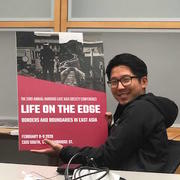
Congratulations to all who participated in the successful Harvard East Asia Society (HEAS) Conference, Life on the Edge: Borders and Boundaries in East Asia.

Pictured: Professor James Robson with members of the 2020 HEAS Committee.
HEAS Committee Chair Will Taylor reflects on this year's event and the experience of organizing it.
"An icy weekend in February saw the 23rd annual East Asia Society Conference return to Harvard. This year’s theme was ‘Life on the Edge: Borders and Boundaries in East Asia’.
Following on the heels of the Hong Kong protests and interminable trade war negotiations, the title felt appropriate, a way into exploring what sharpens divisions between us; as new restrictions on movement and xenophobia surge in the wake of coronavirus, it now feels even more so.
But borders don’t always mean bad news. Karen Thornber’s closing speech spoke to the healing power of literature and how it bridges boundaries; the recent success of Parasite in the Oscars shows appetite for culture surmounts national borders.
Our presenters and their papers also testified to the porousness of international boundaries. Delegates and the general public attended from across the globe; our panels covered a smorgasbord of topics, ranging from Rome-Han relations to Chinese rap music to North Korean library loans.
For presenters starting out in academia, the conference provides a valuable opportunity to meet the next generation of their field and a foundation for future research. The impact the conference can have on future careers was on clear display among our panel chairs: Mingwei Song, a former graduate delegate and now an assistant professor at Wellesley, returned to lead a discussion on futurism in East Asia.
Running the conference has forged friendships in the Regional Studies – East Asia cohort. Besides the chance to hone leadership skills and organization nous, working on the conference secretariat gives our course a real sense of community. Though we all have different academic interests and take different classes, the shared project tied us together. As well as opening doors to the fantastic depth of Harvard’s East Asia expertise, the RSEA program and the HEAS conference lets you make a small contribution of your own to the field."
The HEAS Conference was made possible through the support of the Harvard University Graduate Student Council, Harvard Asia Center, the Fairbank Center for Chinese Studies, the Reischauer Institute for Japanese Studies, the Korea Institute at Harvard University, as well as the Committee on Regional Studies East Asia.
| updated-HEASconference-brochure-1_01.pdf | 15.49 MB |